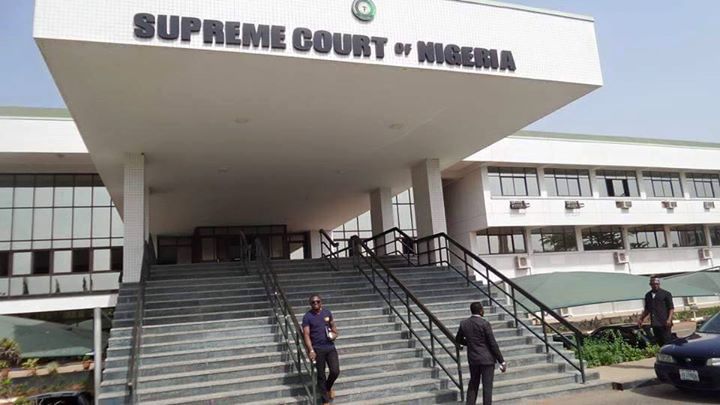By Reuben Abati
“Wahala be like bicycle” is an expression that most people familiar with Nigerian street lingo would easily identify with. It refers the unusual, the dramatic, a shocking development in the course of normal business. “Wahala” is actually a Hausa word, in terms of its linguistic origin, since incorporated into the normal run of Nigerian expressions. The phrase has also since been turned into music by UZBOI featuring TEESWAG (January 2021). It would one day get into the Oxford Dictionary of Modern English.
This is of course not the same thing as that recent bicycle event of 79-year-old US President Joe Biden getting his feet hooked in the pedal of his bicycle in Delaware, and falling down. Biden stood up and did some small jumping up and down to show that all was well and his doctors confirmed same to be true. The “Wahala” that this piece discusses is of a problematic kind: enormous “walaha” and crisis in the Supreme Court of the Federal Republic of Nigeria. The Supreme Court, here or elsewhere, is the apex court of the land. It is, in defining its character, not an infallible court, but it is final because its decisions are final; per Oputa JSC in Adegoke Motors vs Adesanya (1989).
The only recourse beyond the Supreme Court is God, not even the West African Court of Appeal can overturn this apex court. Only the Supreme Court can rehearse its own decisions and reverse itself. Its word, so to speak, is law. It is indeed for this reason that the Justices of the Supreme Court and the entire judiciary, deriving their locus and powers under Section 6 of the 1999 Nigerian Constitution, and the doctrine of the separation of powers as articulated for eternal relevance and coherence by Baron de Montesquieu in 1748, constitute a major pillar of the balance of powers in society and the protection of the rule of law. It is not for nothing that the Supreme Court has been celebrated as the last hope of the common man, that final temple of justice where the law lords define the law, give the law and interpret the law to modulate and to ensure social justice. Years ago, I had the great pleasure of writing a long Man-of-the-Year-Essay in The Guardian newspaper of Nigeria, in which the Editorial Board of the newspaper chose the Nigerian judiciary as the most impactful defender of the people’s rights and the rule of law. It was my job to write the essay. I waxed lyrical.
It is therefore sad that the same Nigerian judiciary is now being spoken about by the same Nigerians and the same country that once looked up to it, as a victim of the proverbial Nigerian factor, a shadow of its former self, and at best a parody. The condition of the Supreme Court today, is particularly pathetic. The kind of abuse, humiliation and ridicule that the Nigerian courts have been subjected to, especially the Supreme Court of Nigeria and its justices, has very few precedents elsewhere, except may be notably, India and Pakistan. A compromised judicial system and a divided, disoriented Supreme Court is of no use to the advancement of the rule of law or the democratic process. The judex are expected to be above board and to be impartial unto death. Their code of conduct forbids them from jumping into the arena of partisan politics. They are required to be independent, utterly without bias and guided strictly by the law, and their oath of office to interpret the law and deliver justice without fear or favour.
With regard to these principles and their value in Nigeria, there is cause for worry. And it is indicated in the following shape. Yesterday, 14 Justices of the Supreme Court of Nigeria, wrote a letter now in circulation, and addressed to their boss, the Chief Justice of Nigeria, Ibrahim Tanko Muhammad (CJN), titled: “The State of Affairs in the Supreme Court of Nigeria and Demand by Justices of the Court.” It is a blistering, sucker-punch, indictment of the sitting CJN. It is important to reproduce some of the stated concerns. Their Lordships, 14 of them, wrote as follows: “My Lord The Honourable Justice of Nigeria, we, the Justices of the Supreme Court of Nigeria, carefully reviewed the state of affairs in this Court, and unanimously resolved to write formally and draw the attention of Your Lordship to our demands. As a Preamble, let it be clearly understood that the resolution to write Your Lordship was reached with sense of responsibility. We are serving this country diligently and to the best of our ability. We resolve disputes between the Executive and the Legislature including all manner of disagreements, between governments and individuals. We are responsible citizens of this country. It would be a tragedy if the Nigerian public were to know that we are unable to resolve our problems internally without going public. The decision to write you formally must be seen by Your Lordship as an effort on our part to preserve the dignity of the Judiciary and the respect accorded to us by Governments and the people of Nigeria. God forbid the day that our internal issues become a matter of National discourse.”
My take: Sorry, Mi’Lords, that day has passed. The rot in the Nigerian judiciary has since been a matter of enduring concern. The harassment of judges by the Economic and Financial Crimes Commission (EFCC), the abuse of ex parte applications by judges and lawyers, the blatant violation of rules of procedure and practice directions, and the utter disrespect for the Bench by both lawyers and litigants, with spoken and unspoken allegations of corruption, compromise and sheer abuse had served the signal that all has not been well with the Nigerian judiciary. Now that there is turmoil even at the level of the Apex Court, the country’s court of last resort, there is cause for anxiety, if not outrage. Their Lordships talk about not going public, again sorry, the matter is now public and it is a proper subject for national discourse. Whoever leaked the letter to the CJN for public consumption and attention has done so intentionally. It is, however, good that we are allowed to know that the Supreme Court of the land has internal problems. Really?: The CJN has completely ignored the report to that effect since March 24? Justices of the Supreme Court claim further, that they have no access to the internet. They also do not have enough complement of vehicles, and even the ones that they have are “either refurbished or substandard”. Justices cannot go for trainings either but the CJN travels with his own “spouse, children and personal staff.” They even suggest corruption: “We demand to know what has become of our training funds, have they been diverted, or is it a plain denial? Your Lordship may also remember that the National Assembly has increased the budgetary allocation of the Judiciary. We find it strange that in spite of the upward review of our budgetary allocation, the Court cannot cater for our legitimate entitlements. This is unacceptable!”
I cringed reading the foregoing lines. But the letter is even far more damning with serious additional complaints about lack of medical care for judges, decadence of the courts, and “the implication that this arm of Government is potentially shut down”. The other day, magistrates in Cross Rivers State carried placards and went to the streets in protest. The emerging Supreme Court debacle is very much after the same fashion. What exactly is left of the rule of law and the justice administration system if justices of the land’s apex court begin to carry placards about their conditions of service? I have searched in vain so far for a denial of the contents of the letter in question, to protect myself, from the error of contempt ex facie curiae involving the apex court of the land, but I have not seen any statement by any of learned Justices disowning the damning statement that has been in the public domain so far. What rings in my head, and is beginning to give me headache, is their threat to the CJN: “It is either you quickly and swiftly take responsibility and address these burning issues or we will be compelled to (take) further steps immediately. May this day never come.” What further steps? Would the Justices of the Supreme Court of Nigeria stop sitting? That indeed would be the day!
The fact that a statement such as the one above, that I have quoted in extenso regarding the Supreme Court in Nigeria, is in circulation is an indication of the rot within the Nigerian system. It simply means that no section of Nigeria is immune from violation. Nigeria, it is commonly said happens to people, classic euphemism for failure and collapse. If Nigeria happens to the common man’s last bastion of hope, routinely identified as the Supreme Court, then everything is lost. A deprived Supreme Court and judiciary as described can of course, be easily compromised. In an election season, that would be a prescription for anarchy. Those who condemn the Nigerian judiciary already observe for example, that basic civil cases are piling up at the Supreme Court while political cases are treated with the speed of light! This is all things considered, a sad development. There are critics of the Nigerian judiciary who consistently posit that the golden days of the Nigerian Supreme Court are long gone. Shockingly, it has been more than 30 years since the Supreme Court of Nigeria was considered golden.
Once upon a time in this same country, and notably, under military rule, this was the same Court on which Bench sat legends of the law like Kayode Eso, Chukwudifu Oputa, Andrews Otutu Obaseki, Ayo Irikefe, Chukwuenike Idigbe, Augustine Nnamani, Mohammed Bello, Adolphus Karibi-Whyte, Ephraim Akpata, Bola Babalakin, Anthony Aniagolu and others. On both the Supreme and Appellate Courts, these justices gave Nigeria an image of the role of the law as an instrument for nation-building. For more than a decade they spoke the law to power. They were fearless, independent, firm and robustly intelligent. They were leaders of an incorruptible court, dramatized for posterity in D. Olu Adegoke’s play, The Incorruptible Judge (Evans Publishers, 1962). The men we remember were first class jurists, with background in law and the humanities – Classics, Philosophy, Literature. Some of them could speak Latin, they could quote Shakespeare, and deploy wit, depth and wisdom in an effortless manner. They used the law as an instrument of value and as a social modulator, for the benefit of humanity. They were judicial activists whose heroism could be seen in the manner in which they stood for the rule of law and against military and civilian potentates who sought to violate the people’s rights as seen in such cases as Federal Civil Service Commission vs. Laoye; Ojukwu vs. FG; AG Bendel vs AG Federation; AG Ogun State vs. Federation; Garba vs. University of Maiduguri; Gani Fawehinmi vs. NBA. Their story has been told in a more nuanced manner in Professor Itse Sagay’s Book, A Legacy for Posterity: The Works of the Supreme Court, 1980 – 1988.
I had a more personal and direct intimation of the heroism of this class of Justices during a conversation recently with Dr. Wale Babalakin, SAN, son of the legendary Justice Bola Babalakin. I was waiting at an elite lounge of the Murtala Muhammed International Airport for a private jet, to take me to Abuja, when Babalakin walked in and asked me if I would join him, since he was leaving immediately. Don’t ask me what a journalist was doing in a private jet lounge. Na today? Nigerians like to abuse and insult journalists, wrongly and stupidly. Some useless people in fact, just recently attacked my colleagues who had gone to cover the arrival of Asiwaju Bola Ahmed Tinubu, Presidential candidate of the ruling party, the APC, from Abuja to Lagos, and I hope those guys will be identified and punished. The whole drama was pointless anyway. Peter Obi, Presidential candidate of the Labour Party went all the way to the Land of the Pharaohs, in far-away Egypt and came back, there was peace, nobody’s skull was cracked. Asiwaju Tinubu went to common Abuja that everyone goes to, and Lagos would not rest. He was the one, not Peter Obi, that brought back a pyramid of chaos. My friend, Gbenga Omotoso, Lagos Commissioner for Information and Strategy says it is all lies. But let me go back: Here was an opportunity, the other day, for me to get to Abuja early, and Babalakin is a good guy, so off I went with him.
In the course of our hour-long trip to Abuja, we ended up discussing this and that, and the state of the nation’s judiciary was our main topic, not knowing that there would be a bombshell coming from that direction in a matter of days. He was restrained. He did not want to make comments about serving Justices. But he was ready to talk about his Dad – what he learnt from Justice Bola Babalakin and also from Chief Rotimi Williams, the first Nigerian to become an SAN, the legendary Timi the Law – who for more than five decades dominated the Nigerian litigation landscape like a colossus, and who took him under his wings. It was not yet Father’s Day, which was celebrated only a few days ago, but Babalakin could well have been singing Luther Vandross’s classic song, “Dance with My Father” (2003) before Father’s Day. Justice Bolarinwa Oyegoke Babalakin, JSC, CON, CFR, certainly made a great impression on his son. He spoke about him from Lagos to Abuja. It was a story of responsible leadership at home, in the community, and the country, a man who held his own on all fronts at home and in the outside community, a jurist who remained a shining light and reference point till the end of his life. I could feel the chemistry between father and son, even if one was dead and the other is the inheritor of a distinguished legacy. I thought Wale Babalakin, SAN, sounded like he would love to be like his Dad but the times are different. His Dad, from his own account, was a simple, modest man, who shunned the glitter and just wanted to serve humanity. Generations of jurists trooped to Gbongan, a quiet, rural community to drink from the fountain of Justice Babalakin’s wisdom.
It is sad that the same supreme Court that he and his contemporaries and immediate successors helped to build into a great institution is now the same place where, if care is not taken, would be dragged ridiculously on social media and trashed unapologetically by politicians who would not allow any cheap opportunity to pass. We need to rescue the Nigerian judiciary from the pedals of “wahala.”
























Leave a comment